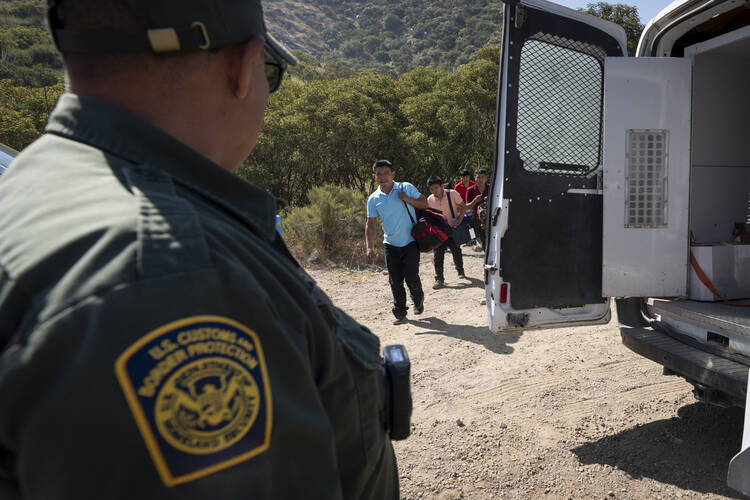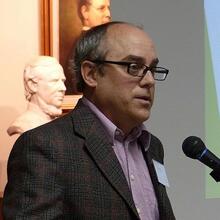Immigration may be one of the most important issues in the 2024 campaign, but a newly released national survey by the Center for Applied Research in the Apostolate (CARA) suggests that it is unlikely to push the Catholic vote decisively in one direction. According to the survey results, most adult Catholics in the United States say the church informs their opinions about immigration at least “somewhat,” but only 19 percent say it informs their opinions “very much.” The poll showed that U.S. Catholics are divided on several aspects of immigration policy. For example, 43 percent said that current immigration levels should be decreased, compared with 23 percent who said immigration levels should be increased and 34 percent who said they should remain as they are now.
The survey of 1,342 self-identified Catholics was conducted in December 2023, with results released in late June by CARA. (The full report can be downloaded here.) Respondents were presented with four excerpts from three sources outlining church teachings on immigration, migrants and refugees—from the United States Conference of Catholic Bishops’ “Forming Consciences for Faithful Citizenship” document; the U.S.C.C.B.’s Catholic Ministries Serving Migrants and Refugees; and Pope Francis’ message for the 109th World Day of Migrants and Refugees in 2023. Majorities of respondents found all four of these excerpts to be “somewhat” or “very” reflective of the teachings of the Catholic Church, indicating an awareness of where the church stands on these issues.
Fifty-five percent of respondents said that church teachings on migration, refugees and immigrants were “somewhat” or “very much” important to them personally. This was lower than the percentages who said that teachings related to marriage, care for the environment and abortion were important to them, but it was higher than the corresponding numbers for teachings about the death penalty, birth control and euthanasia. When asked the degree to which the Catholic faith informs their opinions about immigrants and refugees, 19 percent of respondents said it does “very much.” The largest group, 35 percent, said their faith “somewhat” informs their opinions on the topic, with 19 percent saying “only a little” and 27 percent saying “not very much.”
Respondents were asked to select the most important problem facing the country, and immigration was the fourth-most-frequent answer, after the high cost of living/inflation, the economy in general and guns/gun control.
Among those most likely to think the level of immigration to the United States should be increased were those aged 18 to 34 (36 percent), Hispanics (30 percent) and those attending Mass less than weekly but at least once a month (27 percent). Among those most likely to say immigration levels should be decreased were Republicans (62 percent), those aged 55 and older (57 percent) and non-Hispanic white respondents (52 percent).
Mixed feelings on the effects of immigration
Fifty-seven percent of U.S. Catholics said they agreed with the statement that immigration has a “mixture of good and bad” effects. The number saying it is a good thing and the number saying it is a bad thing was the same—20 percent—and 3 percent said they have no opinion. Among those most likely to believe immigration is a good thing for the country were Democrats (28 percent) and those aged 18 to 34 (27 percent). Republicans were the most likely to believe immigration is a bad thing for the country (34 percent).
When asked about impacts on specific aspects of life in the United States, respondents generally said immigration was making things worse, with some exceptions. The areas where immigration was seen as making matters worse are: crime (56 percent worse and 7 percent better), taxes (50 percent worse and 15 percent better), the economy in general (48 percent worse and 24 percent better), and social and moral values (38 percent worse and 21 percent better). A plurality, 40 percent, saw immigration as having little effect on job opportunities for themselves or their families. But 39 percent saw immigration as making food, music and the arts better in the United States, compared with 16 percent who said these have been made worse. Older Catholic Republicans tended to see immigration as making matters worse, and younger Democrats more often saw immigration as having not much of an effect or improving things.
Respondents were more likely to see the situation at the U.S.-Mexico border as a “major problem” (40 percent) rather than a “crisis” (34 percent). Twenty-six percent saw it as a minor problem (20 percent) or not a problem (6 percent). Those aged 55 and older are more likely than those aged 18 to 34 to believe the border situation with Mexico is a crisis (46 percent compared with 19 percent). In addition, Republicans were more likely than Democrats to believe the border is a crisis (48 percent compared with 23 percent).
Sympathy for undocumented immigrants
A majority of adult Catholics, 58 percent, say they were either “somewhat” or “very” sympathetic toward undocumented immigrants in the United States. The groups most likely to be “very sympathetic” to undocumented immigrants were: Democrats (31 percent), Hispanics (30 percent), those aged 18 to 34 (29 percent) and those attending Mass weekly or more often (28 percent). The groups most likely to be “very unsympathetic” to undocumented immigrants were Republicans (37 percent) and non-Hispanic white respondents (28 percent).
Respondents were also asked questions about specific policies that may be relevant to church teachings about immigration and refugees. Sixteen percent of Catholics said they “approve strongly” of allowing Central American refugees to come to this country, and 27 percent agreed “somewhat.” Sixteen percent disapproved “strongly,” and 15 percent disapproved “somewhat.” The remaining 26 percent neither approved nor disapproved. The groups most likely to “approve strongly” of refugees from Central America coming to the United States were Democrats (24 percent), those aged 18 to 34 (26 percent), Hispanics (20 percent) and those attending Mass weekly or more often (20 percent). The groups most likely to “disapprove strongly” were Republicans (29 percent) those aged 55 and older (24 percent) and non-Hispanic white respondents (21 percent).
Half of U.S. Catholics said they favor expanding the construction of walls along the U.S.-Mexico border (32 percent “strongly” and 18 percent “somewhat”). Twenty-seven percent opposed the idea (15 percent “strongly” and 12 percent “somewhat”). The remaining 23 percent neither favored nor opposed the expansion of border walls. The groups most likely to “favor strongly” of expanding walls along the U.S.-Mexico border were Republicans (56 percent), those aged 55 and older (44 percent) and non-Hispanic white respondents (41 percent). Those most likely to “oppose strongly” the idea were Democrats (23 percent).
Respondents were asked about the governors of Florida and Texas having bused or flown asylum seekers in their own states to Democratic-led states like California, Illinois and New York. Forty-four percent agreed “somewhat” or “strongly” with this policy, while 34 percent disagreed “somewhat” or “strongly.” Those most likely to “strongly agree” with the policy of sending migrants elsewhere were Republicans (38 percent), weekly Mass attendees (36 percent), men (29 percent) and those aged 55 and older (28 percent). Those most likely to “strongly disagree” were Democrats (31 percent).
Respondents were also asked about the mayor of New York City limiting the time that migrant families can stay in city shelters to 60 days. Forty-five percent agreed “somewhat” or “strongly” with the policy, and 26 percent disagreed “somewhat” or “strongly.” Those most likely to “strongly agree” with the policy were Republicans (30 percent); those most likely to “strongly disagree” were Democrats (16 percent).
Three of the most consistent divides among U.S. Catholics on immigration attitudes are partisanship, race and ethnicity, and age. Catholics who identify as Democratic, are something other than non-Hispanic white, or are young adults tend to be more open to immigrants and refugees. Catholics who identify as Republican, are non-Hispanic white, or are older tend to be less welcoming. These differences are unlikely to change much before the November election.








